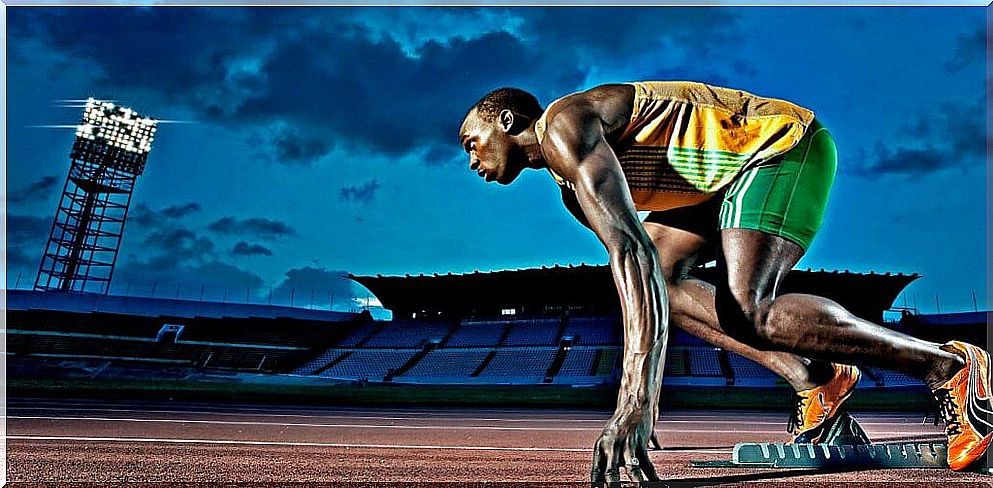What Psychological Factors In Sport Serve To Improve Performance?

High-performance athletes claim that 90% of their sporting success is due to their ability and mental training . In high-level professional sports there are no great differences between some athletes and others in terms of potential, training or physical ability. Therefore, psychological factors in sport are differential and determining to achieve success.
Over the last few years, the interest in knowing the psychological factors in sport has been increasing. This fact has caused professionals related to psychology and sports to ask themselves the following question: what psychological variables determine sports performance?
What is clear is that mental factors affect athletic performance, not only in high-level athletes but for anyone who practices any sport. Currently, there is evidence to support a hypothesis: in sports activity, whether elite or leisure, it may be useful to develop certain psychological tools that increase sports capacity and performance.

What are the psychological factors in sport that improve athletic performance?
We all know that practicing sports on a regular basis directly benefits our health. It has also been more than proven that exercise influences our mental health for good. And it is that playing sports has many benefits for our mind, including greater attention, greater ability to work with others and a potential increase in our self-confidence.
On the other hand, and continuing with the thread of the introduction, the psychological factors in sport that most influence performance are self-confidence, motivation, emotional control and concentration.
- Motivation: it is very important in any task in which we want to optimize performance, and especially in sport. Think that athletes are continuously exposed to ups and downs, triumphs and defeats and that in many cases in intrinsic motivation, love for what they do, which leads them to get up after a bad pass, a disastrous throw or a lot worse than they had in mind.
- Concentration: on the other hand, athletes need a great capacity for concentration. All actions, even the simplest or the most intuitive, require concentration. Any poorly executed move can cause a failure, fall, or injury that derails months of preparation. Therefore, rarely, no matter how undemanding the training may be, an athlete is distracted.
- Emotional control: developing mental training exercises that help control emotions or doubts can make the difference between the success or failure of an athlete. In this sense, many of the times that an athlete has their performance affected by poor emotional control, it is because they have allowed their emotions to affect their concentration.
- Self-confidence: finally , the confidence in one’s own personal abilities to carry out an action successfully is an essential condition for achieving victory.

Mental techniques to control psychological factors in sport
The practice of professional sports requires a high degree of emotional involvement. This is because the psychological characteristics of the athlete’s activity are determined by the actions of the game, by the competitive objectives and by the athlete’s traits.
First you have to identify and analyze the strengths and weaknesses of athletes, to be able to apply personalized techniques to optimize their performance and confidence. Otherwise, the intervention can backfire on the athlete himself.
The most used techniques to improve sports performance are:
- Attention control : refers to internal and external attention. Internal attention is when an athlete focuses on aspects that take place in their own body (thoughts, self-talk, sensations or movements). External attention refers to when an athlete focuses on issues outside of him.
- Goal setting : they help athletes have a global vision of the work they must be doing and the objectives they must achieve to achieve their final goal.
- Self-instructions : these are short messages or verbalizations that we say to ourselves to motivate or focus. It is about using rational, positive, logical and realistic self-messages.
- Relaxation : A relaxation technique is any method, procedure, or activity that helps a person reduce physical and / or mental tension. They generally allow the individual to reach a higher level of calm, reducing their levels of stress, anxiety
- Mental representation : mental representations are symbolic ways of reproducing reality in its absence. To give meaning to what surrounds us, representations are organized into structures and built on the basis of a social context typical of a given group.
Finally, it should be noted that sport, especially high-level sports, has a lot to do with suffering and pain. Not only with the one that produces the exercise itself, but also with it that is indirectly derived from it. Thus, if you ever have the opportunity to be present in a discharge session made by a physiotherapist to a professional athlete, you will be able to see this suffering reflected on his face. Hence, sport is a magnificent school for our personal resilience and that many of the techniques that have been implemented in it from psychology can be used in other highly competitive and demanding contexts.









